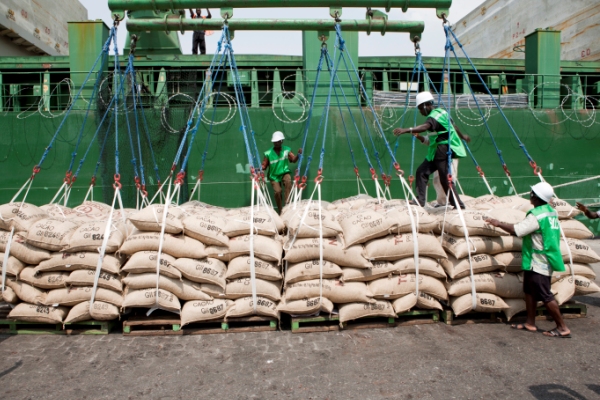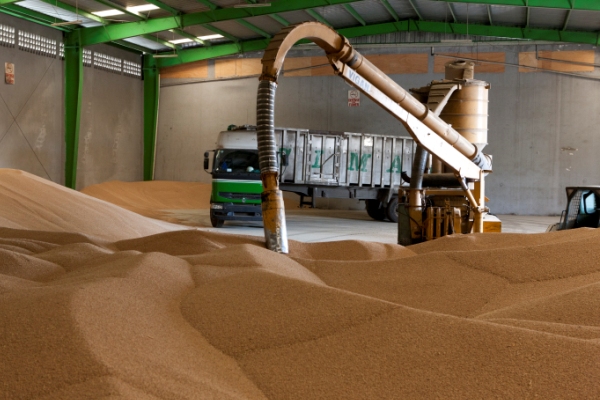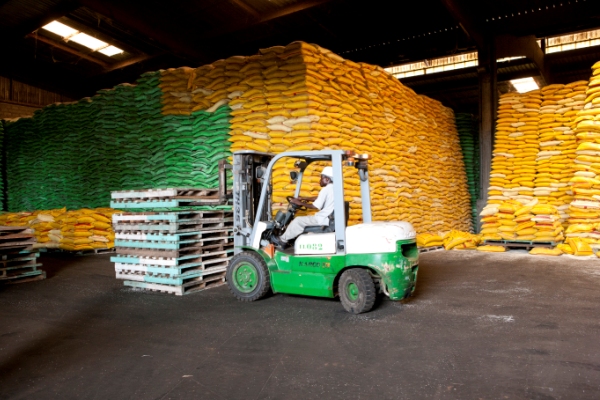Overview of SIMAT: Société Ivoirienne de Manutention et de Transit
Stéphane Eholie, Chief Executive Officer of SIMAT (Société Ivoirienne de Manutention et de Transit)
Stéphane Eholie gives an evaluation of the logistics sector, mentioning the competition, SIMAT’s differentials, the areas to be developped and the importance of quality and social responsibility. Mr Eholie also shares his vision for the future of Côte d’Ivoire in the coming years.
Interview with Stéphane Eholie, Chief Executive Officer of SIMAT (Société Ivoirienne de Manutention et de Transit)
After the events that occurred in 2011, Côte d’Ivoire has had growth figures of about 9% per year. When we talk about growth, we are talking about everything to do with consignments, handling, commodity trading, transit, etc. This shows some real development. What is your evaluation of the sector?
I am positive about this sector. I often say that 9% or 10% growth, especially in developing countries such as Côte d’Ivoire, which is a maritime country, represents millions of tonnes passing through the ports in both exports and imports. People say that ports are the lungs of an economy and that is definitely the case for Côte d’Ivoire, on a macroeconomic level for sure. Of course if it is inclusive, 9% growth rate is a direct response to the port activities, such as warehousing, handling, unloading, ship freight loading, even more so than it is a response to the airport activities. I think it is basic to know that this sector is going through a readjustment phase and will not suffer from that. This sector never failed in the past because it is very important for the economy.
Today if you want to offer a quality service, you must be able to know what you clients require, which means reliable and efficient logistics. We are always investing in warehouses and renewing our equipment in order to increase our capacities.
In what way does the country’s growth have an effect on your company?
The 9% growth automatically affects positively our business by making us growing internally. It is perfectly clear that we are increasing our market.
You may have seen the port today, and noticed that we need more warehouses. All of our warehouses are full at the moment. We have full rotation for imports and for exports. There are many large projects going on here. There is a lot of handling activities happening here either conventional or in terms of containers. If you mind containerisation today, I would say that there is growth of about 10% or more. For us, as a company that carries out all of the main activities in terms of transport, I can assure you that it automatically affects us, maybe without necessarily increasing our market share. With such a growth, we should also be seeing 9% or 10% growth in our turnover, in a parallel manner.
That means that this could attract new players and competition. How are you positioned in relation to your competition? Would you say that there is room for more competition?

Yes, I would. There is room for people that are interested in investing because the elasticity of logistics and warehousing is not very strong or sufficient for now.
We still have volume and space both at Abidjan and San Pedro. We are still looking for financing to buy equipment and to build warehouses. The demand is extremely high. I would say that Côte d’Ivoire´s main strength is to have ports that serve for both imports are exports. We know that merchandise for exports and imports cannot be mixed in the same warehouse. Merchandise and warehouses have to be specialised and separated. Today if you want to offer a quality service, you must be able to know what you clients require, which means reliable and efficient logistics. We are always investing in warehouses and renewing our equipment in order to increase our capacities.
A strong indicator, nowadays, is the rental price of a warehouse explosion. That means that although what we offer today, it is not totally sufficient, the demand is very high. If the demand is high, it means that economic growth exists and there is confidence in this country and the authorities. This creates a kind of ease and people start to invest and the use of these facilities as security is more or less guaranteed here.
What sets you apart from the competition? Why should people choose SIMAT?
In our business, things are segmented and I do not mean that in a bad way. There are multinationals, there are businesses like ours, there are large and medium sized enterprises and there are small enterprises. This sector of business, requires a lot of capital, in fact it needs a huge amount of funds. I think there is room for more competition because there are niches and specialised activities. We also have infrastructures in place and are able to satisfy the demands of the customers.

If you want to work with businesses dealing in coffee and cacao, you must have the right equipment and above all warehouses for storage. If you want to work with large companies that deal in large exports, you need to have equipment for transport, handling and warehousing.
Segmentation happens as a consequence of what is on offer here in terms of warehouses and equipment. Furthermore, another important factor that separates one company from another is the company culture and customer service. Factors such as meeting client expectations, company presentation, philosophy, education and culture are very important when it comes to dealing with clients. SIMAT combines and delivers all these factors and thanks to that, many industries want to work with SIMAT instead of working with other companies.
In which areas do you have the most experience and strengths? Which areas would you like to develop?
We do well in the fields of exports, particularly of coffee, cacao and cashews. We have also started to export cotton from both Abidjan and San Pedro and we export sugar and rice. We are going to begin carrying out oil related activities particularly in terms of solvent sublation. Over the next 5 years, we really want to move forward with container activities. I think this is the future for our business and I believe it is an area which offers more added value than the conventional activities. For this reason, we strive to get involved in this field. Another important segment is everything dealing with lose products such as wheat amongst others.
You now have the ISO 9001:2008 certificate. Is having the ISO 9001:2008 an important factor for being competitive?

I believe it is a very important factor for several reasons. Our company try hard to be a socially modern and responsible company. Today, when you talk about Africa and countries like Côte d’Ivoire, which is soon to become an emerging country, you have to note that in order to be an emerging country you must have SMEs and SMIs and you need the informal sector to be reduced and the formal sector to be increased. We are embarking on this journey. All modesty aside, a company like ours tries to compete with the multinationals. To do this, we must follow some regulations. The ISO quality certification is not the ´open sesame´ of the business but it is practically obligatory if you want to compete for tenders, which always ask for your certification. The mere fact, do not have that certification make some larger companies view you in a different way. Having the EGS certification, EGS being a well-known multinational group, allows us to demand a kind of respectability for everything we are trying to do. It makes non-sense to be certified by companies that are not recognised.
This is just the tip of the iceberg in terms of the benefits of this certification. The ISO certification has also allowed people and companies to become more aware of some aspects and procedures in this business. Offering a quality service is a question of behaviour and I believe that delivering quality means following procedures: rigour and efficiency. It allows you to change the culture in your company. If you are certified, it will bring good things for your business. For example, certification allows you to ensure your business continuing to exist for the future.
I have always wanted to be certified. Abidjan is now certified and in the next 6 months, we are going to do all we can to certify San Pedro. We would also like to certify all the activities we do and services we provide. It’s a matter of reviewing the company; it is not a complete culture change but rather a reassessment practice.
You mentioned social responsibility. What is SIMAT´s philosophy in this regard? What social responsibility activities do you carry out?
SIMAT is a social company because we are talking about Ivorian capital and assets. It was set up during the hardest times of the crisis in 2001. It was founded from a deep conviction and desire felt by all involved, to be united and able to take control of one´s own destiny. We have to be honest, Africa is always the victim of false pessimism, no one ever believes in the leaders or in anyone else. We would like to prove that you can be African and successfully run a company and be a good manager, just as you would run and manage any European company.
We are also a socially responsible company because we made our sacrifices during the crisis, we were there in the midst of it; we were present, and I thank God we survived. I think this shows how much we believe in our country, invested and will continue to invest in our country. Africa is not going to develop and change if Africans themselves do not believe in their countries and take control of their destinies. As a leader and promoter of this company, I strongly believe in the African continent and especially in Côte d’Ivoire.
You mentioned finding financing for purchasing equipment, investing in logistics, etc. Could you tell us a bit more about how you approach this?
Two or three years ago, one of our major challenges was finding long-term resources and funds. This business not only requires long-term investment for all activities but it is an area of business that is highly capital intensive. Today, thankfully, Côte d’Ivoire is highly frequented and is a respectable and desirable location for such activities. This means that many people now intend to come and invest in Côte d’Ivoire, and so the capital and the resources are now available.
A company like ours has to increase its capital, that´s why we have begun this process both in terms of long-term resources, i.e. capital and in terms of borrowing. We are in the middle of this process and I hope to end up with it by the end of 2014 or the beginning of 2015. We aim to offer right issues or secondary equity offerings and to increase our own funds to be able to ensure follow up investments. Furthermore, in the coming 5 years, we want to be able to grow externally in the sub regional countries. This is the process that we are in right now.
What is your vision for Côte d’Ivoire over the next two or three years?
I am back from working in Brazil, a country that has the same climate, the same race typology and the same kind of environment as Côte d’Ivoire. Brazil is an emerging country. The President of the Republic of Côte d’Ivoire has set the goal for Côte d’Ivoire to become an emerging country by 2020. To make it possible, we need the SMEs and the SMIs to be one of the main pedestals of our economic growth and we need the African people to be able to seize their goals, as I said before. We need Ivorian leaders in the industrial and services sectors, so that Ivorian people will be able to play their role in the stated development policy right now.
Côte d’Ivoire just came out from a crisis and in three years we had been able to get ourselves back on our feet and had gone further than expected. We have our third bridge now and I hope we will have four, five, six, even seven bridges in the future. Roads precede development and there is an ambitious construction program of roads and so on.
Concerning this development, I would say that one of the most important roots is education. Globally, policies are reflecting this, beginning with education at school and onwards. I would say that there is still a long way to go to qualify personnel here in Côte d’Ivoire. In 2020, Abidjan will have a population of six or seven million: it will be a true megalopolis. There are lot of things to be done and I hope we will continue on this track for development. Politics plays a part in this, but the private sector should play its part too. I think in 2013, the government did a lot in terms of large projects for development. In 2014 it has help from the private sector and I hope that in 2015 after the elections, the Government will be working with the private sector and foreign direct investors who are arriving here more and more.
I think we are going to build up this country not only by ourselves but also with the help of others, both in terms of South-South cooperation but also in terms of North-South cooperation. Africa today is the last remaining continent to see such growth rates and it is the continent where more people have come to observe how things are developing and who are returning to invest, particularly in Côte d’Ivoire. This shows that there is lots of potential and opportunities here for the years to come. I hope and wish a company like ours be part of this process of development, so that we could gain something from it and reinvest in our country.
FAIR USE POLICY
This material (including media content) may not be published, broadcasted, rewritten, or redistributed. However, linking directly to the page (including the source, i.e. Marcopolis.net) is permitted and encouraged.